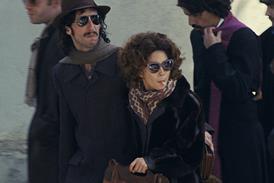Dir. Eugene Jarecki. US.2004. 98mins.
Any serious documentary,one hopes, strives to provoke. Eugene Jarecki's scintillating Why We Fight isa marvel of restraint, making it all the more provocative. Following on fromhis 2002 title The Trials Of Henry Kissinger, he here explores themilitary-industrial complex that has been a primary engine of the US economyduring the 60 years since the end of the Second World War.
The work's absence ofpolemical edge does not lessen its impact, but its unwillingness to 'preach tothe converted' may well limit box-office prospects. Yet while it is unlikely toprove a break-out hit, it should still appeal to the growing audience forin-depth eco-political documentaries, more so given how it concentrates on anissue with profound implications for our collective future. Its profile canonly be boosted after it won the American Documentary Grand Jury Prize atSundance this week.
The "military-industrialcomplex" is not some left-wing term but rather was popularised, if not coined,by US president Dwight Eisenhower in his farewell address in 1961. The formerWWII Supreme Allied Commander warned his fellow Americans that the symbioticrelationship of defence contractors and military procurers would lead to asituation where war would become an end in itself, thus threatening democracynot just in the US but globally.
Jarecki shows how thisrelationship has morphed through the years into a three-way co-dependency, withcongressional leaders of either political stripe now addicted to the jobs thatcome with fat defence contracts.
One aircraft has a partmanufactured in every US state; any attempt to reduce production will mean aloss of jobs somewhere and could spell political trouble for the representativeaffected. Supporters of the current US administration - whose Vice-Presidentonce presided over a major defence contractor - will be disturbed by the arrayof historical research and intellectual heft brought to bear.
More alarming still is thesense of futility in searching for left-wing bias as Jarecki eschews apolitical position to focus on the social costs of a foreign policy sofrequently dictated by military capability.
The film features numerousinterviews with senior US policy makers and analysts but Jarecki concentrateson those who have a connection with the military, from a young man in the midstof volunteering for service to a retired US Air Force colonel who left themilitary upon realising that there was no correlation between the intelligenceshe was providing and policy decisions made by the Defence Department.
Most compelling of all is aretired New York City policeman and Vietnam veteran whose son was killed in theWorld Trade Centre. His thirst for vengeance lead him to request that hismurdered son's name be written on a bomb destined for Iraq.
Here, Jarecki makes theconnections regular news programmes do not, letting politicians words speak forthemselves as he juxtaposes 'sound-bites' from before and after the US invasionof Iraq. Hence, the administration's claim that Iraq supported the 9/11terrorists is followed by the outright denial that any such claim was made. Thepoliceman's sense of betrayal is palpable, as is his shame that his son's namehas been used for the wrong reason.
The film is also cinematicallyarticulate. Jarecki puts his subjects in situations that maximize the impact oftheir words. The cop is seen on the train he rode to work, recalling the spotwhere - as the train turns and the wheels shriek - the World Trade Centrebecame visible. As he describes the media's repeated airing of images of thecollapsing towers and his own growing rage from repeated viewing, one realisesthat there may be a fourth element to the military industrial complex. "Only analert and knowledgeable citizenry," Eisenhower warned, could be trusted toprotect the country from the risk of "destroying from within that which you aretrying to protect from without."
Prod co: Charlotte Street Films, BBC, Arte
Int'l sales: Cinetic Media
Exec prods: Roy Ackerman, NickFraser, Hans-Robert Eisenhauer
Prods: Eugene Jarecki, SusannaShipman
Cine: Etienne Sauret, May-YingWelch, Brett Wiley, Foster Wiley, Chris Li, Sam Cullman
Ed: Nancy Kennedy
Mus: Robert Miller

















No comments yet